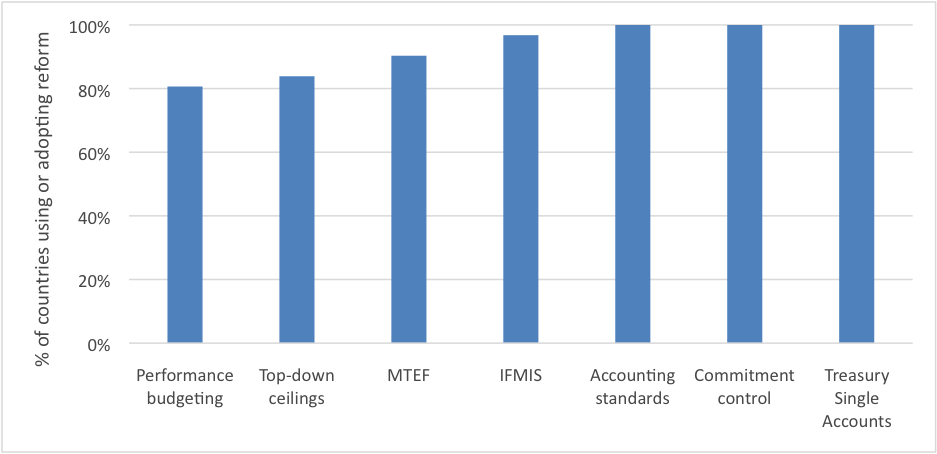My opening line when people ask what I do is to emphasise international development above being an accountant. Thus far this seems to get a very positive reaction from most people, but when I go on to explain that the countries which our programme is involved in includes South Sudan, Liberia, Sierra Leone and the DRC the reaction usually translates into a wry smile and subsequent words of encouragement, consolation and occasionally commiseration.
The forthcoming CIPFA conference provides an opportunity to develop this initial conversation. Working in countries that are fragile and emerging from conflict presents a unique set of challenges. But there are interesting lessons on context, capacity and engendering change that we can learn and share more widely.
Our basic working assumption is that knowledge and expertise in public financial management flows directly from more advanced countries like the UK to countries across Africa and Asia. The impact of this transfer is a steady improvement in performance built on better systems and processes, and an associated improvement in the capacity and capability of existing staff. The bad news is that this does not seem to be true. A variety of standard reforms have been exported as best practice as the following graph illustrates (based on research by Andrews (2010)). But this does not seem to have also translated into improved performance of financial management in all of the 31 countries.
Figure 1: The similarity of PFM reforms in 31 African countries
Source: Andrews
The research raises a number of difficult and uncomfortable questions, such as did these countries really face the same problems and need the same interventions to solve them? Andrews thinks not and concludes that ‘reform similarities belie country differences’. More importantly, the exported reforms do not seem to have had the impact on the performance of PFM systems and this is confirmed in recent research from the World Bank.
Instead of imposing solutions on a “one-size-fits-all” basis we need to look more carefully at context, capacity and how to engender change.
The Budget Strengthening Initiative was set up in 2010 to support PFM in a range of countries in a fragile situation. The experiences from our work have been well captured. See https://www.odi.org/publications/9877-change-challenging-contexts-how-does-it-happen.
The emphasis of the initiative was to focus on reforms that were appropriate and relevant to the conditions in country.
But there are a number of broader lessons from the work done across Africa that may resonate with the challenges we are all facing in our own organisations.
Working collaboratively. Central finance ministries are very rarely the sole solution to a complex delivery issue but much of the support that is provided focuses on a single government entity. Finding solutions through brokering and facilitating interaction across government is often neglected but frequently lies at the heart of successful implementation.
Linking the political and the technical. Political support or authorisation for reform is essential but too often neglected. Successful reform always finds a way to secure support and adjusts what may be possible within the space for reform. Being “politically smart” means that you will have to focus more on the “art of the possible” rather than the “science of international best practice”.
Beware the big bang. While there are occasions when reform needs to be implemented at scale and in an ordered sequential manner, our experience shows us the value of ongoing incremental support and adjusting the reforms and change to the growing capability of the organisation.
Start with a problem and continue to adapt. The answer to many issues is a careful diagnosis of the problem rather than the application of a blanket solution. While this is patently common sense, the litany of failed reforms across the sector highlights that we continue to over-engineer and underestimate the need for implementation support.
Build back smarter. While the impact of Ebola had a devastating impact on both expenditure and revenue in west Africa, there is a need to think carefully about how to deliver reform when the context changes. While increasing the revenue base is an obvious and urgent need there remains a need to get some of the basic functions of government working more effectively. While a robust and resilient health care system is imperative in Sierra Leone an effective system of cash management is a requirement to ensure that resources flow to the place where they are needed the most.
Complementary reforms. The Budget Strengthening Initiative has demonstrated the value of flexible and adaptive support sitting alongside and working in a complementary way with other large-scale providers of support such as the World Bank. There are, however, some reforms where the lessons are not just about process. The Budget Transparency initiative in Uganda built a budget website where you can drill down to look at budget and expenditure detail at a district level. This, together with a call centre that provides the opportunity to interact and engage with government, sets a benchmark for accountable government that many UK organisations could learn from.
The work undertaken so far underscores the value of technical support that is flexible, adaptable, “politically smart” and resolutely problem-focused. Why not come and find out how our experiences “under the sun” could transform a grey day in the UK public sector!
Simon Gill, Project Director of BSI and Bryn Welham, Research Fellow at ODI, will be speaking at the “Why is budget strengthening important?” session as part of the international programme at the CIPFA conference on 13 July. They will share some of the emerging findings from their work across Africa, with a particular focus on Sierra Leone














